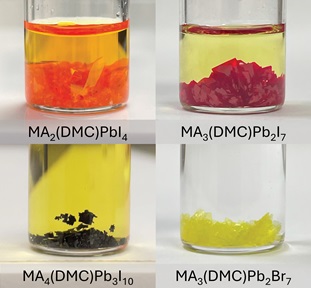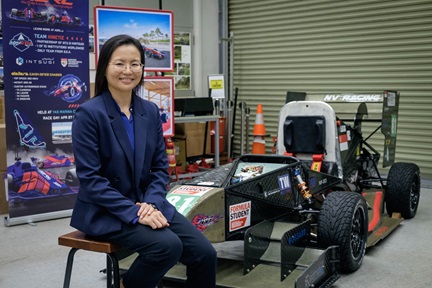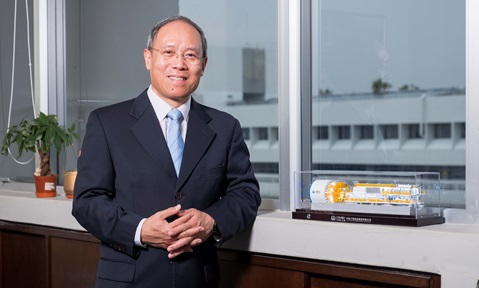Accelerating research excellence
NTU Vice President (Research) and Distinguished University Professor Prof Luke Ong outlines NTU's pathway to a comprehensive research portfolio.

As an internationally recognised research-intensive university, NTU is making strides in new technologies such as artificial intelligence (AI). Research at NTU has also produced holistic solutions to challenges facing the world today.
Prof Luke Ong, NTU’s new Vice President (Research), aims to take NTU’s strengths in research to the next level. The academic leader and computer scientist shares with Pushing Frontiers his vision for a well-rounded research focus at NTU, the importance of interdisciplinary research that solves real-world problems, and what we can hope to see from AI in the near future.
Q: As the new Vice President (Research), what is your overarching vision for research at NTU?
A: As a young university, NTU has performed well in global research indices. We aspire to maintain our standing among the world’s foremost universities. The NTU 2025 research strategy, which aims to improve both the quality and uniformity of research excellence, will continue to be a roadmap for NTU to create societal impact through interdisciplinary research and education.
For NTU to be a great comprehensive research-intensive university, a culture of research excellence is necessary in all disciplines at the University. Besides science, technology, engineering and mathematics (STEM), it is important for NTU to cultivate excellence in SHAPE research, a collective term for research in the Social sciences, Humanities and the Arts for People and the Economy.
My vision is for NTU to be the Massachusetts Institute of Technology (MIT) or the California Institute of Technology (Caltech) of the East. MIT and Caltech are STEM powerhouses with numerous peaks of excellence in SHAPE and, similarly, I aim to establish NTU as a university that excels in STEM and SHAPE research.
Q: How can the NTU community contribute to realising this vision?
A: Like any endeavour, achieving research excellence at NTU is a team sport. Working at NTU should be fulfilling, where researchers, faculty members and administrators can excel in their roles to co-create a conducive research environment.
It is important to treat our colleagues with respect and consideration so that everyone enjoys working at the University. As leaders, we also have a duty to help develop our direct reports to their fullest potential.
Realising this vision will take time, thoughtful messaging from the academic leadership, administrative support as well as sustained investment in human capital and state-of-the-art infrastructure, such as the University Shared Facilities.
Q: Research targeting real-world problems is crucial for solving humanity’s greatest challenges. How can higher education institutes foster an appreciation for such research among its community?
A: Interdisciplinary research that creates solutions for real-world problems can be integrated into all levels of university education, from undergraduate studies through postgraduate training to continuing education. Through these unified research efforts, we can acquire the new knowledge needed to solve complex issues.
To encourage an interest for research in undergraduates, instructors can design a curriculum that teaches students how to do research, as well as give them extended assignments that can produce potentially publishable results.
Q: Tell us more about your research in computer science and the problems you are trying to solve.
A: I am interested in probabilistic programming, a topic that lies at the interface of probabilistic machine learning, Bayesian statistics and programming. It offers a way for algorithms to automatically make decisions through an iterative process of constructing a theory or hypothesis, observing and learning from data, and then revising the theory or hypothesis, much like how scientific progress is made.
Probabilistic programming makes AI more accessible as it allows users to use machine learning algorithms without having to know the underlying mathematics and statistics. This democratisation of AI will enable more researchers to leverage its capabilities to solve some of the world’s most pressing problems.
Another research topic that I am interested in is game semantics – a mathematical theory that views computation as a dialogue game between the environment and the computer program. Prof Martin Hyland (University of Cambridge) and I developed the Hyland-Ong games – a new way to construct the meanings of computer programs using the metaphor of game playing.
This understanding of what computer programs mean mathematically helps developers identify and remove bugs in computer programs.
Q: Beyond the already stunning capabilities of generative AI chatbots like ChatGPT, what else can we expect from AI in the future?
A: Thanks to advances in the ability of AI to make sense of natural languages, AI chatbots such as ChatGPT can now have human-like conversations – an aptitude previously thought to be uniquely human.
Language models like ChatGPT are just the beginning and improvements in human-computer interactions will make using AI even more intuitive. In the future, intelligent virtual assistants with sophisticated language understanding and generation capabilities will perform tasks such as language translation more effectively.
Healthcare is another area where AI is expected to have a major impact. With advancements in computer vision, the technology can aid in the early detection of cancerous tumours, enabling cancer to be treated more effectively. AI can also transform drug discovery and screen a vast number of drug candidates.
In the automotive industry, self-driving vehicles equipped with AI will be able to respond to traffic conditions without the need for human drivers to take the wheel. Many complex and dangerous tasks in logistics and manufacturing industries that are currently done by people can also be outsourced to intelligent machines. At home, smart robots can lend a helping hand in caring for the elderly.
Q: What new opportunities will AI create in society and how can we harness AI to benefit us?
A: Using AI as a tool to assist in tedious, repetitive and dangerous tasks allows us to focus on work that involves human creativity and connection. AI can also equalise access to education by removing barriers such as socio-economic status, geographic location and disability, to enhance learning outcomes. For instance, AI can be incorporated into a digital app that delivers virtual lessons to students anywhere in the world. In these online classrooms, AI will be able to tailor lessons to suit an individual’s learning styles and needs. The technology will also be able to provide automated assessments and feedback to the students in real time.
Q: How can concerns surrounding AI be mitigated to encourage its integration into society?
A: The increasing use of AI has surfaced many issues associated with its use, such as data privacy. Resolving these concerns involves the cooperation of many parties, including lay users, regulators, governments, the companies that develop AI algorithms, as well as generators and curators of datasets. Ultimately, companies should include guardrails to ensure that their products do not cause harm.
Using generative AI to create artwork also raises concerns of plagiarism and the infringement of intellectual property (IP) rights. Regulators should work with governing bodies to ensure that generative AI programmes respect the IP of the original creators.
At NTU, we are committed to mitigating these issues. Our robust data protection policies protect IP and data generated by our researchers. Research at NTU is also paving the way for the responsible use of AI.
Q: Beyond technical understanding, what skills are important for living in a world transformed by innovations such as AI?
A: To thrive in an AI-centric world, it is vital to cultivate digital literacy skills. A basic understanding of how AI works is the first step towards using AI tools more effectively.
While it may seem like AI will take over many aspects of work done by humans, it still cannot replace insights gained from the human experience. Human input is required to prompt the AI on the task it needs to complete and to critically analyse the output generated. In that light, the human qualities of empathy, interpersonal communication and leadership will become even more important.
Human-AI partnerships that combine the precision of AI with the creativity of humans may hold the key to solving some of humanity’s most pressing problems.
Q: What are some attitudes that we should adopt to thrive in the AI revolution?
A: In an ever-changing world shaped by AI, we should embrace lifelong learning and cultivate an inquisitive outlook on life. Continuous learning will future-proof our skills and make us ready to take on new opportunities that arise. Lastly, having an interest in interdisciplinary enquiries will spur the development of solutions for multifaceted problems that lie at the intersection of multiple domains.
The article appeared first in NTU's research & innovation magazine Pushing Frontiers (issue #22, August 2023).



.tmb-listing.jpg?Culture=en&sfvrsn=29c7e020_1)
.tmb-listing.jpg?Culture=en&sfvrsn=55153609_1)


